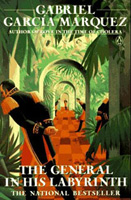|
The General in His Labyrinth, Gabriel Garcia Marques, tr.
Edith Grossman (Alfred A Knopf, 1993)
Review by Jim McCurry
Gabriel Garcia Marquez does not need to remind us and himself
of the ordinary griefs and betrayals, nor need he worry us
and hold us in suspense concerning the ordinary turns of fate.
There is a relaxed, uneventful character to The General in
His Labyrinth (1990). I wonder if the reason that I do not
want to stop reading this narrative lies in the balancing
act between inner and outer, fiction and history, past
and present, reflection and action that Garcia Marquez
has sustained throughout these pages?
Like a poem, this novel entrances me with its centripetal
quietness, its assumption of an inner source of delight. It
is in no hurry to finish. Individual phrases open like roses
(e.g., “the ineluctable smell of roses”). Nuances
open into worlds of suspended time and space for reflection.
It is not as though, for example, we cared, or were led to
care in the ways of realistic fiction, about the relationship
between the General and Manuela. Or rather, perhaps, Marquez
teaches us to care and not to care.
Beneath the romantic flyleaf depicting the General’s
hammock—exposed to the unhealthful night airs of a deceptively
lyrical moonlit lagoon— the book is about as romantic
as the emetics Bolivar resorts to. This book is no bath of
purple verbena.
Absorbed in the magic of the river, dying, in defeat,
perhaps
he wondered if he might not have the courage to say to
hell
with the oregano and sage leaves and bitter oranges of
Jose
Palacios’ advice and sink down into a redemptive
ocean of
purple verbena along with his armies of beggars, his useless
glories, his memorable errors, the entire country.
And so I have been pondering it, resting in the perusal of
a few pages at a time my second time through, actually.
I recommend that you try it too. Try it like one of the General’s
periodic dips in a warm bath, one of his treatments for chronic
insomnia: maybe with some slow music in the background, say
the Concierto de Aranjuez, or maybe Charlie Haden’s
recent NOCTURNE compact disc, featuring the great Cuban pianist,
Gonzalo Rubalcaba.
Marquez gives good guidance through the turnings, station
to station, circle to circle. It is hard to think of Bolivar
as a general. Stereotypes are banned from the precincts of
this labyrinth. Marquez’s Bolivar is someone to ponder.
Beneath and behind, immanent, here, and yet beyond all the
turns and ups and downs of fortune, the author reaches through
to a deeper sense of tragedy: the child’s first glimpse
of not-knowing, the first recognition that one is a child
of illusion, lost in the given: the starkness and mystery,
the arbitrary character of one’s saga in space-time,
one’s temporal existence, one’s life’s fairytale.
A kind of profoundly understated stoicism, a stance of cold
relinquishment, informs the following moment in this lovely,
boring, and absorbing narrative:
He not only left without Manuela, but before leaving
suggested
as a matter of state the advantage of a definitive separation.
‘I see that nothing can unite us under the auspices
of innocence
and honor,’ he wrote to her. ‘In the future
you will be alone,
although at your husband’s side, and I will be alone
in the midst
of the world. The glory of having conquered ourselves
will be
our only consolation.
Manuela, of course, is his mate though not his wife, and
the General is dying, and both of them know it. Even so, this
narrative by Bolivar’s apparent friend across time,
Garcia Marquez, is a careful homage wrought so as to exclude
any obsessive dwelling upon a particular event, this or that
grand passion or fixed idea or relationship. And so we have
not been told very much, involved very much, in a mimesis,
or in any sort of detailed, conventional love story. The story
of Manuela and Bolivar is presented sketchily, intermittently,
and it is all the more moving for that reason.
Too often in reviews we read something like the following:
“The author portrays a friend unsentimentally, but lovingly,
in such a way that we sense that, although the friend in actuality
has died, yet within the pages of his book, the author cannot
let him die.” That’s all right if you like it,
I suppose, but I frankly do not care very much for that sort
of “having it both ways.” And while I very much
doubt that Garcia Marquez and I share the same beliefs concerning
“last things,” it really does not matter very
much in terms of the present book. In the scatological and
sensitive and profound utterances of Bolivar, as well as in
the author’s faithful movements of the pen, one discovers
that the author has captured the universal in the particular
(effortlessly, it seems), merging and shattering such compartments
and categories as “lyric,” “epic,”
and “historical.”
The book is the labyrinth, the sentences are its passages,
and in our slow progress, it is as if we had become shades,
allowed by the author’s guidance and intervention to
dog Bolivar’s last steps, to watch over his shoulder
and hear his dying thoughts. Tied to time, “doomed to
a dramatic existence,” we too waver between action and
reflection perhaps noticing that sometime around midnight
the fiesta stopped playing and “the full moon caught
fire in the patio filled with orange trees.”
Copyright © 2003 Jim McCurry
|


